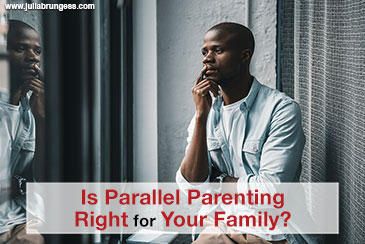If you and your former spouse have difficulty communicating with each other calmly, it can be challenging to take on the responsibilities of shared parenthood. A strategy known as parallel parenting can often provide added help for divorced parents who have serious conflicts with each other or who cannot discuss matters in a respectful manner. Here are some of the most important features of this co-parenting strategy.
Dividing Responsibilities

Rather than sharing responsibility for all elements of the child’s upbringing, parallel arrangements are designed to divide up these tasks and assign responsibility for a specific area to one parent. For example, one parent might take on full responsibility for all medical decisions and treatment visits. The other parent would then deal with educational decisions and arranging for registration and course selections for the child or children. This division of duties will often reduce the need for conversations that could become heated between you and your former partner.
Minimizing Contact

One of the most important features of parallel child-rearing strategies is the minimizing of direct contact between you and your co-parent. To this end, phone conversations are preferable to face-to-face interactions. In most cases, emails are better than either option and provide the most distance between you and your former partner. This can prevent your discussions from becoming hostile and creating further issues between you that can filter down to your children. By making major decisions through a neutral communication platform like email, you can prevent personal issues from standing in the way of raising your children.
Keeping Children Protected
Sheltering children from the damaging effects of arguments and heated disagreements is essential for their continuing growth and health. Parallel parenting is specifically designed to prevent angry confrontations from taking place in front of your children. This will reduce the emotional stress and worry experienced by your children as a result of your divorce and will help you maintain a more appropriate working relationship with your co-parent.
Managing the Post-Divorce Period
Parallel arrangements are extremely useful during the first few months after the divorce process has been finalized. These strategies will allow both you and your former partner to gain some perspective on the split and put some distance between the issues of the past and the challenges of co-parenting in the future. Parallel co-parenting does not have to be a permanent arrangement. As you and your former spouse or partner become more comfortable, you can change the way you communicate to provide added convenience for both of you.
Focusing on the Children

Another big advantage of parallel co-parenting is that it takes the focus away from the disagreements between you and your former partner and places it on the welfare of the children. By limiting the number of interactions necessary to make decisions and creating specific guidelines that allow you to communicate effectively, you and your co-parent can concentrate on providing the best possible environment for the children you are raising.
If collaborative parenting is not a practical option for you and your former partner, parallel parenting may be the right solution for your situation.

